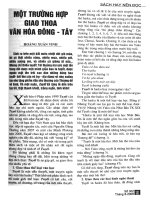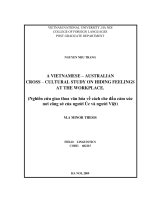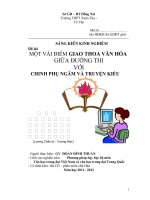giao thoa văn hóa
Bạn đang xem bản rút gọn của tài liệu. Xem và tải ngay bản đầy đủ của tài liệu tại đây (2.46 MB, 37 trang )
Group 11
Nguyễn Ngọc Bảo Châu
Hoàng Thị Hoài Giang
Lê Thị Diệp Hương
Nguyễn Mai Lan Hương
Lê Thị Anh Thư
Introduction
Lê Thị Diệp Hương
Question: Where can we experience
the differences among cultures?
American-Japanese cultural clash in
the movie “Lost in translation”
TRAILER
Bob Harris: American actor, comes to
Japan to shoot a commercial and
participates in some game shows
Charlotte: a recent Yale graduate, goes to
Tokyo with her husband- a busy
photographer
PLOT
Both of them are looking for the meaning of their lives
and have difficulties adjusting to the surrounding life.
They meet each other, get acquainted, start the
“adventure”, explore Tokyo, explore a brand new foreign
culture, explore each other and explore themselves.
2 Americans encounter Japanese culture in several
situations, get confused and surprised for many times.
JAPAN AMERICA
High power distance Lower power
distance
Collectivism Individualism
High Power Distance as seen
in the scene “Greetings”
Nguyễn Mai Lan Hương
POWER DISTANCE
Scene: Bob arrives from the airport at the hotel and is
welcomed by the Japanese staff.
The staff people greet him, give him presents and
business cards by both hands.
The hotel staff shake hands and bow to him.
+communication of respect is important.
+subordinates and superiors differ in communication
behaviors.
Example:
•
Giving Bob presents [Picture]
•
Presenting business cards with both hands [Picture]
•
Bowing [Picture]
Signifies the respect
Shows the hierarchical relationship, the comparative
status of the people involved
The subordinates must bow deeper and longer to the
superiors
Back
Back
Back
America - a lower power
distance country than Japan
Bob is a little surprised because he is American.
The US: slightly lower than the median on
power distance
the social status and communication roles are
less marked.
people shake hands rather than bowing when
greeting
Japanese maintain parts of their traditional
culture and include guests in it to a certain
extent.
They don’t expect foreigners to bow properly, a
nod of the head is sufficient.
Individualism seen in
the scene “Charlotte’s
phone call”
Lê Thị Anh Thư
INDIVIDUALISM
Charlotte is alone in her hotel room.
She calls a friend at home, trying to
explain and express her worries,
including her relationship with her
husband, which is not going well.
But to her distress, the person she calls
is busy and does not have the time to
listen to her and help her out, so she is
left as lonely and alone as before.
Individualism as seen
in the scene “Bob’s
phone call”
Hoàng Thị Hoài Giang
INDIVIDUALISM
Bob is taking a bath when the telephone
rings and his wife calls.
She’s calling about decorating his new
office at home.
They don't connect.
Then he asks about the kids and she
gives him the usual response "they are
fine but they miss their father, but
they're getting used to your not being
there".
She is distracted, and they cannot lead a
normal conversation.
His wife shows little concern about Bob and his
life in Japan.
In Western culture, each person has his or her
own private space.









